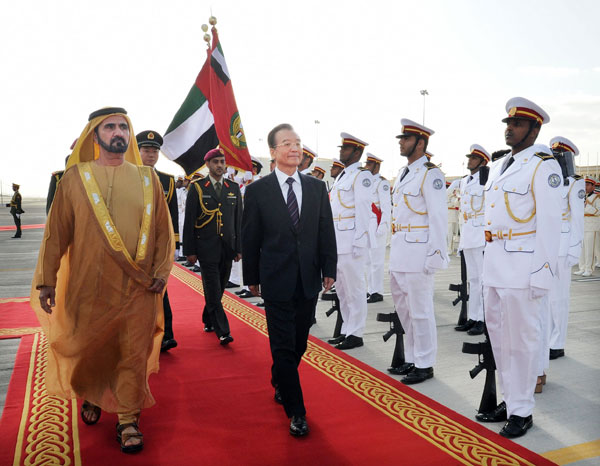- About cippe
- Introduction
- Review
- Exhibitors Services
- Exhibition Rule
- Floor Plan
- Exhibit Profile
- Freight Forwarder
- Exhibitor Manual
- Hall Index
- Stand Contractor
- Contact Us
- Visitors Services
- Visiting Info.
- Pre-registration
- Visa Information
- Contact Us
- International Visitor Organiser
- Concurrent Events
- cippe Summit
- Seminar
- News
- Industry News
- cippe News
- Strategic Partners
- Overseas Agent
- Media
- Accommodation & Traffic
- Traffic Map
- Accommodation




Proposal for Global Energy Oversight
A global governance mechanism for energy under the G20 framework to stabilize oil and natural gas markets was proposed by Premier Wen Jiabao on Monday as he addressed a key Middle East-based forum for renewable energy.
The proposed mechanism should incorporate suppliers, consumers and transit countries to draft "fair, reasonable and binding" global rules, Wen told the Fifth World Future Energy Summit.
"Quite obviously, resolving future energy issues will have to take into account not only economic and technological factors, but political and global factors as well," Wen said, adding that all nations should take joint action to "reduce the frustration and inequalities that result from problems in energy resources".

Sheikh Mohammed bin Rashid Al Maktoum, vice-president and prime minister of the United Arab Emirates and ruler of Dubai, welcomes Premier Wen Jiabao at Abu Dhabi airport on Monday. Li Tao / Xinhua
Wen's remarks were made as potential disruptions to existing flows of oil and gas loom large.
Iran warned Gulf states on Sunday not to make up for shortfalls in its oil exports under prospective US and European Union sanctions. Teheran, Beijing's third-largest oil supplier after Saudi Arabia and Angola, has threatened to shut down the world's most vital oil transit channel, the Strait of Hormuz.
Wen's suggestion clearly takes into account shifts in the Middle East for the global energy market, said Shen Yamei, a researcher with the China Institute of International Studies.
The proposal reflects the need for the international community to work together to achieve sustainable growth, Shen said.
Wen is on a six-day tour to the Middle East, aiming to boost relations between Beijing and the Islamic world. On Monday afternoon Wen became the first Chinese Premier to visit the United Arab Emirates.
He met UAE President Sheikh Khalifa bin Zayed Al Nahyan and Crown Prince of Abu Dhabi Sheikh Mohammed bin Zayed Al Nahyan.
"China has always respected the choice of the people of West Asia and North Africa," Wen told the summit.
"As a permanent member of the United Nations Security Council and a responsible power, China will, along with the international community, enhance peace, stability and development in West Asia and North Africa," he said.
Because of the strategic position and large energy reserves, China hopes countries in West Asia and North Africa will focus on stability and development, Shen said.
Earlier, in Riyadh, his first stop, Wen called for greater business ties and said China was willing to join hands in "coping with challenges and safeguard common interests" with Saudi Arabia in meetings with local leaders.
In a joint communique released late on Sunday, Beijing and Riyadh stressed the need to prevent the spread of weapons of mass destruction and expressed support for a non-nuclear Middle East.
Iran has claimed its nuclear activities are strictly for peaceful purposes but charges that it is secretly working on nuclear arms have escalated in recent weeks.
Calling development of nuclear energy a "strategic choice in resolving future energy supplies", Wen on Monday said all countries should boost renewable and clean energy.
Saudi Arabia, the UAE and Qatar, the last leg of Wen's trip, invest heavily in renewable energy. Riyadh has announced aims to generate solar energy at an equivalent capacity to its oil exports, while the UAE is home to Masdar, a carbon-neutral city and a global clean technology cluster. Qatar is the world's top exporter of liquefied natural gas.
The UAE has been hosting the World Future Energy Summit since 2008. Monday's summit attracted more than 26,000 people, including 3,000 delegates, 650 exhibiting companies and 20 national pavilions.
UN Secretary-General Ban Ki-moon also spoke at the summit. Wen held talks with Ban and Iceland's President Olafur Ragnar Grimsson on Monday afternoon.
